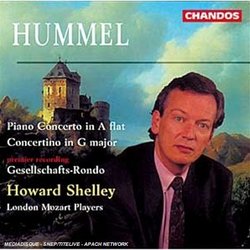| All Artists: Johann Nepomuk Hummel, London Mozart Players, Howard Shelley Title: Hummel: Piano Concerto, Op. 113 / Concertino, Op. 73 / Gesellschafts-Rondo, Op. 117 - Howard Shelley / London Mozart Players Members Wishing: 0 Total Copies: 0 Label: Chandos Release Date: 10/21/1997 Genre: Classical Styles: Chamber Music, Forms & Genres, Concertos, Historical Periods, Classical (c.1770-1830), Instruments, Keyboard Number of Discs: 1 SwapaCD Credits: 1 UPC: 095115955826 |
Search - Johann Nepomuk Hummel, London Mozart Players, Howard Shelley :: Hummel: Piano Concerto, Op. 113 / Concertino, Op. 73 / Gesellschafts-Rondo, Op. 117 - Howard Shelley / London Mozart Players
CD Details |
CD ReviewsHummel's Last and Most Ambitious Piano Concerto Dexter Tay | 06/16/2008 (5 out of 5 stars) "I'm surprised while Hummel's two most famous piano concerti (the A minor and B minor, which Liszt played to astounded audiences at the age of 11) garnered such enthusiastic reponse from listeners enamoured with this great predecessor and in many ways, a direct inspiration of Liszt and Chopin, few ventured to lend their ears to his last and biggest (and in my opinion his greatest) piano concerto. The A flat major (a key favoured by early Romantics like Dussek, Kalkbrenner and even Chopin) Piano Concerto has the concentration of Hummel's pianistic powers and wisdom that he had accumulated through the half decade of his life and it is perhaps the apogee and best example of a concerto that is clearly classical in its structure and texture but preciently romantic in its pianistic writing. That, perhaps is the difference that marks Beethoven and Hummel, even so when detractors have chosen to ignore or are plain ignorant to unjustly and unfavorably compare them, to the effect of labelling Hummel as a second-rate Beethoven. Some failed to see that Hummel's significance to subsequent pianist-composers was just as important, or even more important than Beethoven - pianistically. While Beethoven had said what he needed to say with his 5 piano concerti - the last being the "Emperor" completed by 1810, Hummel continued to compose in this genre well towards the end of his life and his works constitute important testamants that chart the development of the musical form between the two decades that straddle the "Emperor" and say, Chopin's concerti. Beethoven's pianistic writing was clearly classical and one possible speculation why he had stopped composing in this genre after 1810 for the next 17 years of his life was perhaps due to the phenomenon that younger composers like Hummel and Moscheles have taken the form to realms in which he felt his own contribution was becoming less and less relevant, especially so in the all-so-public sphere of the concerto, thinking it better to be handled by a next generation of composers. Although Hummel was not alone in this development, he could rightly be regarded as the most veteran composer at the point in time when rapid changes to the piano concerto occured. Field, Kalkbrenner and notably Moscheles exemplified the sound world of the pre-Romantic piano concerto and both took their cues from Hummel pianistically. Understandably, the early concerti of Kalkbrenner and Moscheles were the most direct models which Chopin, Liszt and Hiller composed from. While Kalkbrenner and Moscheles shared the reputation as "colleagues" of Chopin and Liszt, Hummel was a respected but increasingly anachronistic and distant figure, cast in a rigid classical mould of a preceding generation in the light of the budgeoning Romantic frenzy that engulfed Europe from 1830s onwards. Nevertheless, the A flat concerto took the musical world by storm when it premiered in 1829, so much to the effect that it was used as the yardstick of comparison for the subsequent exodus of concerti that appeared for some years after 1830 (including Chopin's, which I feel, some contemporaneous commentators have erroneously thought to superior to Hummel's last concerto). Listening to the second movement of Hummel's last concerto, it would not be difficult to imagine how the young Chopin would have been transfixed while listening to it for the first time and subsequently penning a strikingly similar slow movement to his own first concerto. A grandiose, gallant, romantic and joyous work, the allure of this concerto lies in its elegant charm and the combination of a Mozartean classicism with lush proto-Romanticism that detracts attention from the athletically mortifying difficulties it presents to the soloist. If the two famous minor concerti were barnstormers that presented challenges previously unknown to the repertoire - Hummel's last concerto takes it even higher on the Parnassum by making it an imperative for the soloist to play it in a manner that commands the highest technical virtuosity without compromising the essential good spirits of the music. Howard Shelley, with his super-human abilities, has shown once again how the concatenation of these factors is humanly possible. The other works are delectable pieces that form part of Hummel's large output for the piano and orchestra, but anyone interested in Hummel's music and his contributions to the Romantic generation of piano concerti should purchase the disc for the sake of the masterly piano concerto itself." Absolutely enchanting Michael C. Cressey | New York NY | 06/09/2010 (5 out of 5 stars) "I have owned this CD for several years and it has brought me more pleasure than I can remember.
It is absolutely enchanting: a master piece with very few equals. A perfect blend of classic and early romantic music: you will not be disappointed. It belongs on the top shelf of any classical music lover!" |


 Track Listings (7) - Disc #1
Track Listings (7) - Disc #1